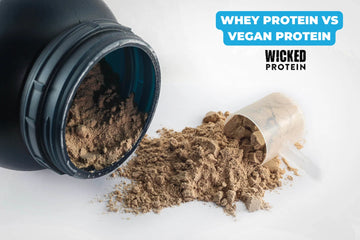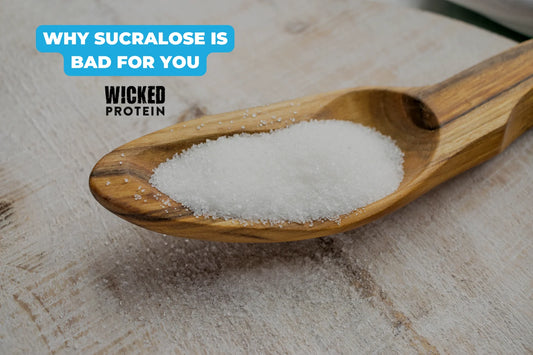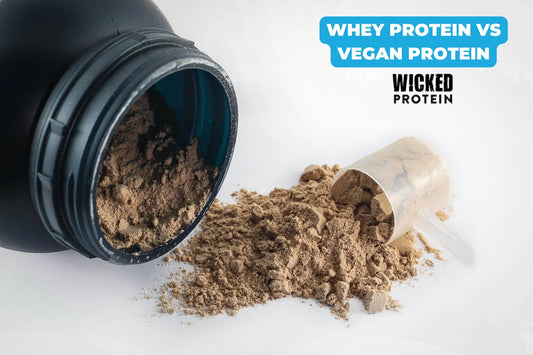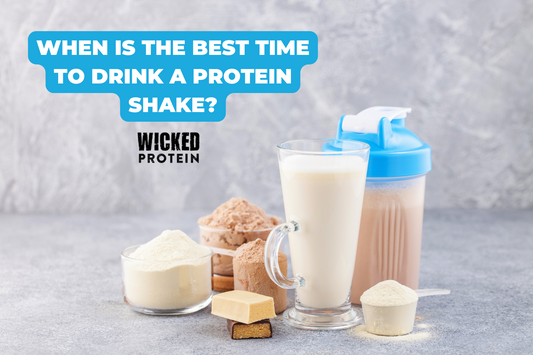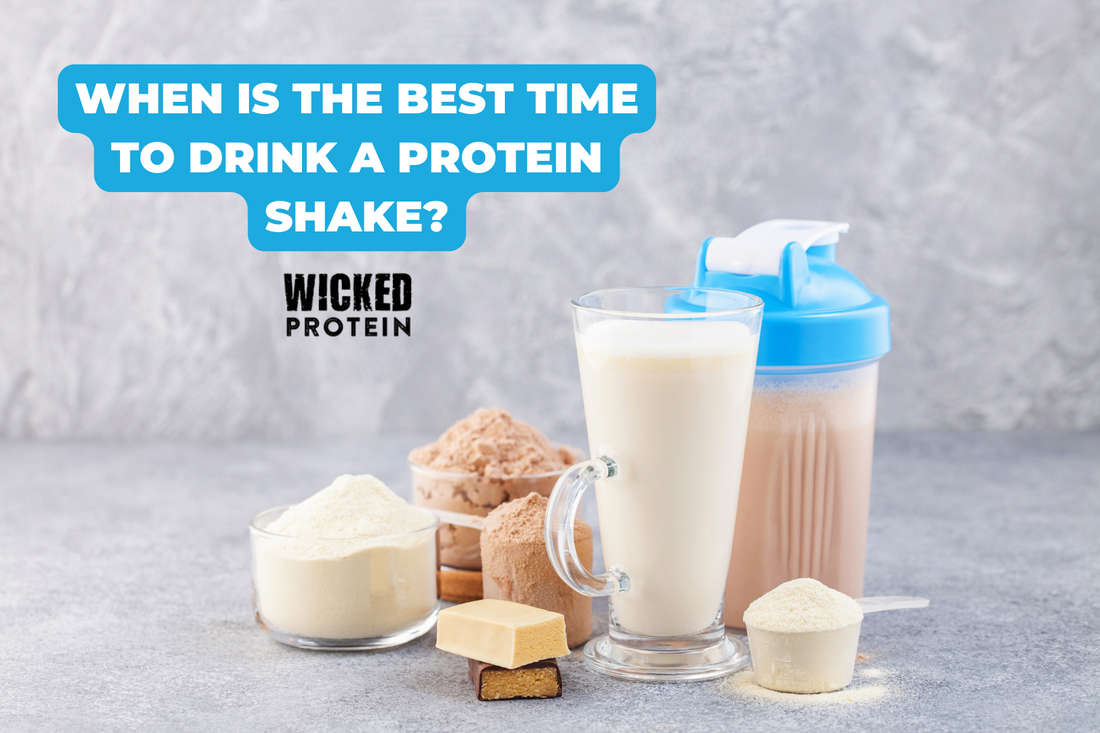
When Is The Best Time To Drink a Protein Shake?
If you’ve been to the gym before, you’ve probably heard all about protein powder, protein shakes, protein bars, and other related products.
Regular gym-goers have different opinions regarding the best time to drink a protein shake, some even rushing to drink them immediately after finishing their last set.
Generally speaking, it’s far more important to consume enough protein than the exact time you’re going to consume it.
If you’re doing any kind of workout or resistance training, the best time to drink a protein shake is directly before or after exercise.
However, you can drink protein shakes at any time of the day and will still enjoy the muscle-building benefits.
Does The Time You Drink a Protein Shake Matter?
There are tons of different opinions going on about the best time to drink a protein shake. Some scream that the best time to drink it is after the workout, others say it’s before workout.
However, the timing isn’t as important as you think it is. The quality and the amount of protein you consume are far more important than the timing.
Take a look at how to choose the right protein powder.
That being said, there might be slight differences in the benefits you get that are directly correlated with the timing of protein shakes.
You should choose when to drink a protein shake based on your workout goals.
When Is The Best Time To Drink A Protein Shake?
Depending on whether you want to boost endurance, lose weight, or build muscle, there are specific times that benefit each goal most.
In The Morning
Starting your day with a protein shake is a great way to boost your metabolism and provide your body with the necessary nutrients after a night of fasting.
If your goal is to lose weight, a healthy breakfast paired with a high-protein shake will help you feel fuller in the morning and less likely to snack later in the day.
Before Workout
Drinking a protein shake before a workout can give your muscles all the amino acids they need for optimal performance and endurance. This can help prevent muscle breakdown and enhance recovery post-workout.
However, you should take into consideration that consuming too much protein or food before a workout can lead to nausea during high-intensity training or even unpleasant digestive issues.
If this happens to you, it’s best to save your shake until you’re done with the workout.
After Workout
The body’s ability to build muscle mass is heightened for up to 24 to 48 hours after exercise, meaning you have a much larger window of opportunity to consume protein than you probably thought.
Drinking a protein shake after your workout can help accelerate recovery, reduce muscle soreness, and promote muscle protein synthesis.
If your goal is to build muscle, drinking a protein shake after working out can amplify your efforts.
Before Bed
Having a protein shake before bed can provide a slow release of amino acids during the night, which supports overnight muscle growth and repair.
Casein protein, in particular, is known for its slow digestion, making it an excellent choice for a bedtime shake. This can help prevent muscle breakdown while you sleep and optimize your body's nighttime recovery processes.
Is It Okay To Drink a Protein Shake on an Empty Stomach
Drinking a protein shake first thing in the morning won’t cause you any harm, it will only enhance the rate of amino acid absorption.
When you consume protein without any other macronutrients, the body can focus solely on breaking down and absorbing protein.
This timing is also beneficial for weight loss, as mixing your protein shake with other tasty ingredients will promote satiety and prevent you from snacking and eating unnecessary calories.
Types of Protein Shakes
There are various types of protein powders and shakes out there, and each one has unique characteristics and nutritional benefits.
Here are the four main types of protein.
Whey Isolate
Whey Isolate is the most popular choice due to its rapid absorption and high protein content.
It is known for being low in lactose, making it suitable for individuals with lactose intolerance.
Whey Concentrate
Whey concentrate is a less processed version of whey isolate that hasn’t been stripped off of most its lactose and fat.
Lower-end concentrates usually have around 30% protein, and the higher-end ones go up to 90% protein content.
Casein Protein
Casein Protein is a slow-digesting protein that is often consumed before bedtime to support muscle recovery overnight.
This type of protein shake forms a gel-like consistency in the stomach, resulting in a sustained release of amino acids.
Casein Protein is beneficial for promoting muscle preservation in periods of fasting or rest.
Soy Protein
Soy Protein is one of the most nutrient-rich plant-based protein source derived from soybeans, making it an excellent option for vegetarians and vegans.
This type of protein shake is rich in essential amino acids and may provide various health benefits, including heart health and hormonal balance.
Protein Shake Myths
Protein shake timing myths have been circulating in the fitness world, leading to confusion about the best time to consume protein shakes for optimal results. Let's debunk some of these misconceptions to help you make informed choices about your protein intake.
There have been plenty of myths about protein shakes circulating the fitness world, leading to confusion and different opinions.
Myth 1: The Anabolic Window Is Only 30 Minutes Post-Workout
A common myth is that there is a short post-exercise window, usually 30 minutes, that will increase the benefits and the muscle gains you get if you drink protein shakes at that time.
However, the common belief is not true, and evidence suggests that the anabolic windows may last up to 5-6 hours after exercise.
Myth 2: Protein Shakes Will Make Me Bulk Up
While high-calorie protein shakes can help you with weight gain if you add them to your diet, they alone won’t make you bulky.
Protein shakes can be used for weight loss, weight management, and weight gain, and it all depends on your fitness goals.
Myth 3: Protein Shakes Are Not For Rest Days
Many believe that protein shakes only help when consumed around workout time or on active days. However, this isn’t true.
Our muscles take up to 24 hours to recover from a workout, meaning a protein shake on a rest day will still have benefits and help boost recovery.
Conclusion
The best time to drink a protein shake depends on your personal fitness goal. Whether you choose to enjoy your shake in the morning, before bed, or around workout times, what matters most is that you’re consuming enough high-quality protein.
Remember, protein shakes are meant to be paired with a healthy diet, and are not a replacement for one.



